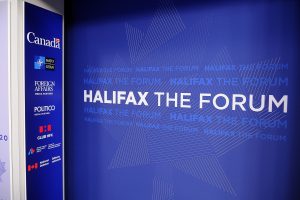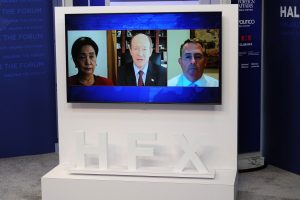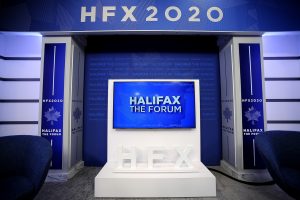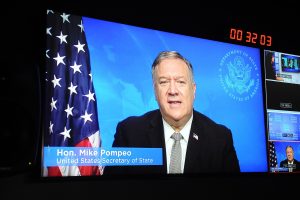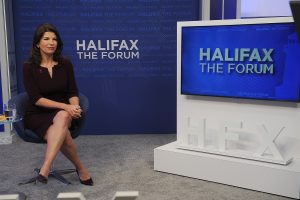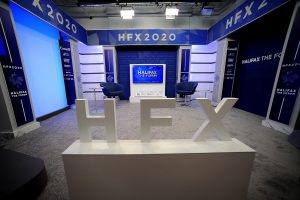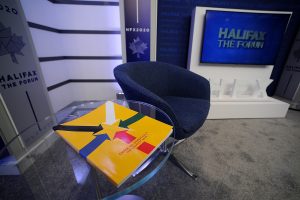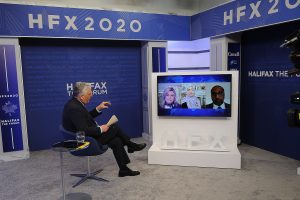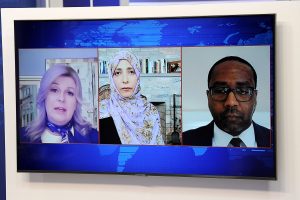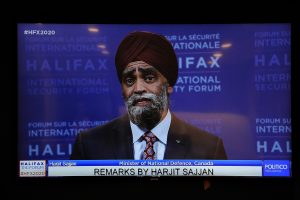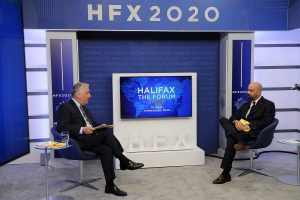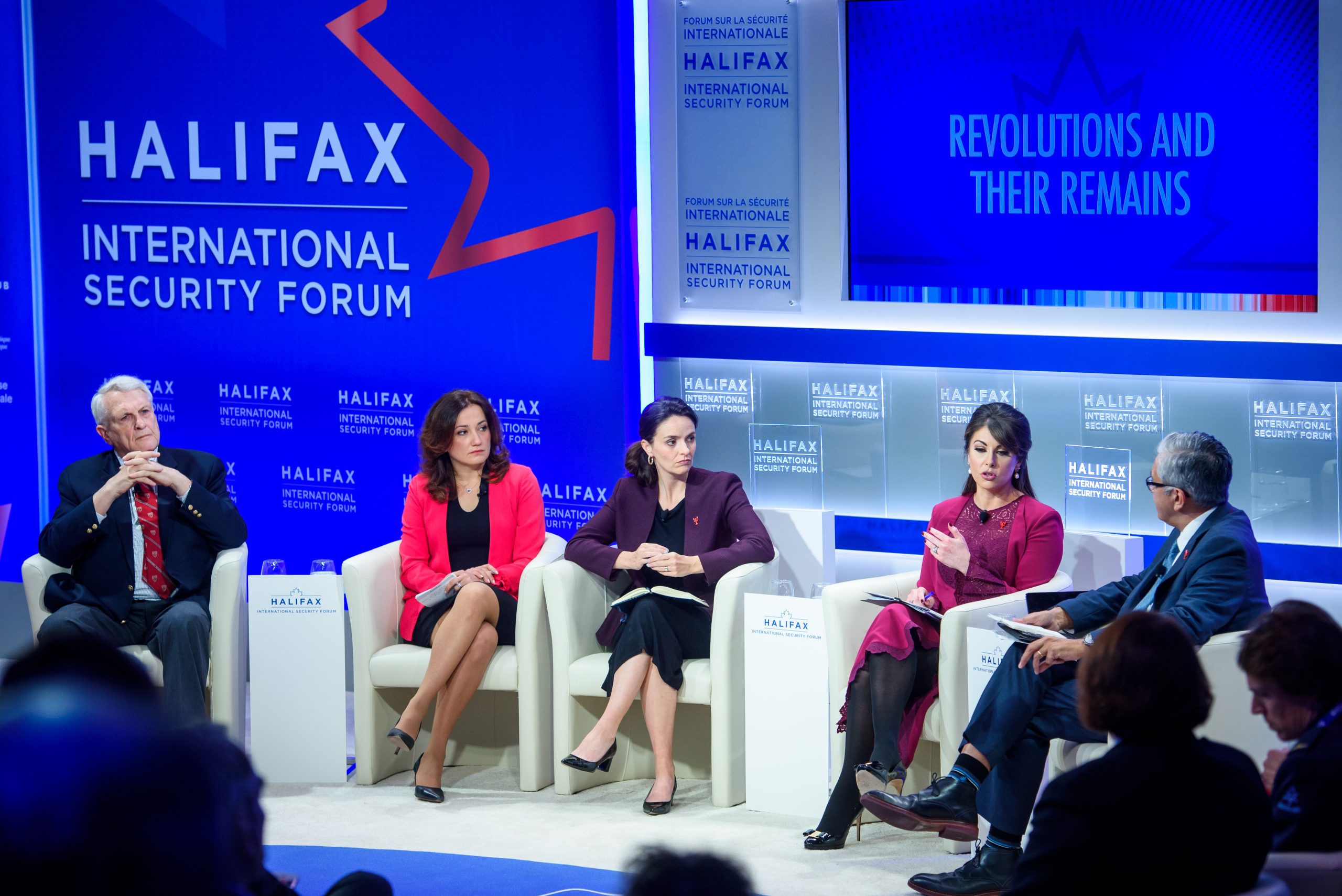
2020 HALIFAX INTERNATIONAL SECURITY FORUM
DATE
November 20-22, 2020
LOCATION
Hybrid
PARTICIPANTS
300
AGENDA & SPEAKERS
8:00 EST
Informal Sessions via Zoom Off the record
Africa Matters
- WITH: Rob Bauer, Chief of Defence, Netherlands Armed Forces; Esther Ibanga, Pastor, Jos Christian Missions International, Executive Director and Founder, Women Without Walls Initiative; Ann Fitz-Gerald, Director and Professor, Balsillie School of International Affairs; Lassina Zerbo, Executive Secretary, Comprehensive Nuclear-Test-Ban Treaty Organization
- HOSTED BY: John Glenn, Policy Director, U.S. Global Leadership Coalition
Climate: Changed
- WITH: Jason Bordoff, Founding Director, Center on Global Energy Policy, School of International and Public Affairs, Columbia University; Kevin Short, Chief of Defence, New Zealand
- HOSTED BY: Andy Fillmore, Member of Parliament for Halifax
France, Freedom, Faith
- WITH: Isabelle Lasserre, Deputy Editor, Le Figaro; Nicolas Tenzer, Chairman, Editor, Center for the Study and Research on Political Decision, Le Banquet
- HOSTED BY: François Lafond, Special Adviser to Deputy Prime Minister for European Affairs, President, Republic of North Macedonia, Blue Networks and Opportunities, Paris
From Moscow to Minsk: Putin’s Poison
- WITH: Andrei Sannikov, Chairman, European Belarus Civil Campaign; Rajmund Andrzejczak, Chief of Defense, Poland; Vladimir Kara-Murza, VP, Free Russia Foundation; Peter Hultqvist, Minister of Defence, Sweden
- HOSTED BY: Kurt Volker, Distinguished Fellow, CEPA, Senior International Advisor, BGR Group
Himalayan Heat: Sino-Indian Friction
- WITH: Dhruva Jaishankar, Director, US Initiative, Observer Research Foundation; Steve Tsang, Director, China Institute, School of Oriental and African Studies, University of London
- HOSTED BY: Alyssa Ayres, Senior Fellow for India, Pakistan, and South Asia, Council on Foreign Relations
Israel’s New Friends
- WITH: Tzipi Livni, Former Minister of Justice, Former Minister of Foreign Affairs, Israel; Mustafa Barghouti, Secretary General, Palestinian National Initiative
- HOSTED BY: Leslie Campbell, Senior Associate and Regional Director for Middle East and North Africa Programs, National Democratic Institute
10:00 EST
Opening
HFX2020 kicked off in a world that has been fundamentally changed by the COVID-19 pandemic. Instead of gathering in-person in Halifax, this year HFX participants gathered virtually around the world to participate in the first major international security conference to meet since a divisive US election.
Facing existential threats posed by climate change, rising power struggles and a global pandemic, the cooperation fostered by HFX has never been more important. HFX President Peter Van Praagh started the conversation by reaffirming the commitment that HFX makes to the strengthening of democratic institutions with the unveiling of a handbook on how to deal with an increasingly aggressive China. It is designed for democracies, but its recommendations are accessible for citizens, HFX2020 participants and decision-makers alike. The main message of the handbook? When democratic countries come together, the world is a safer place.
Canadian Defence Minister Harjit Sajjan paid special tribute to Canadian armed forces who rose to the challenges of COVID-19 and provided tremendous logistical support to help Canadians return home from abroad. They also pitched in with critical support to hospitals in the spring. At the same time, COVID-19 doesn’t make our other national security obligations go away. Ultimately, the pandemic has reminded us of the importance of multilateral relationships around the world. Even with the challenges of 2020, vaccines present a light at the end of the tunnel and forums like HFX provide a mandate to strengthen our democratic institutions.
“The Halifax International Security Forum, like the US itself, is both an ideal and an entity.”
— Mr. Peter Van Praagh, President, Halifax International Security Forum
“We know that the best way forward is for countries who share the same values is to work together, fostering dialogue and cooperation.”
— he Hon. Harjit Sajjan, Minister of National Defence, Canada
“Canada’s position as a stable middle power means we can do more to safeguard and reinforce our partnerships that have defined global cooperation for 70 years.”
— he Hon. Harjit Sajjan, Minister of National Defence, Canada
10:40 EST
Plenary 1: Democracy vs. Ourselves: Divided We Fall On the record
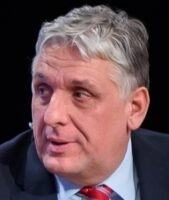
Moderator Robin Shepherd
Vice President, Halifax International Security Forum
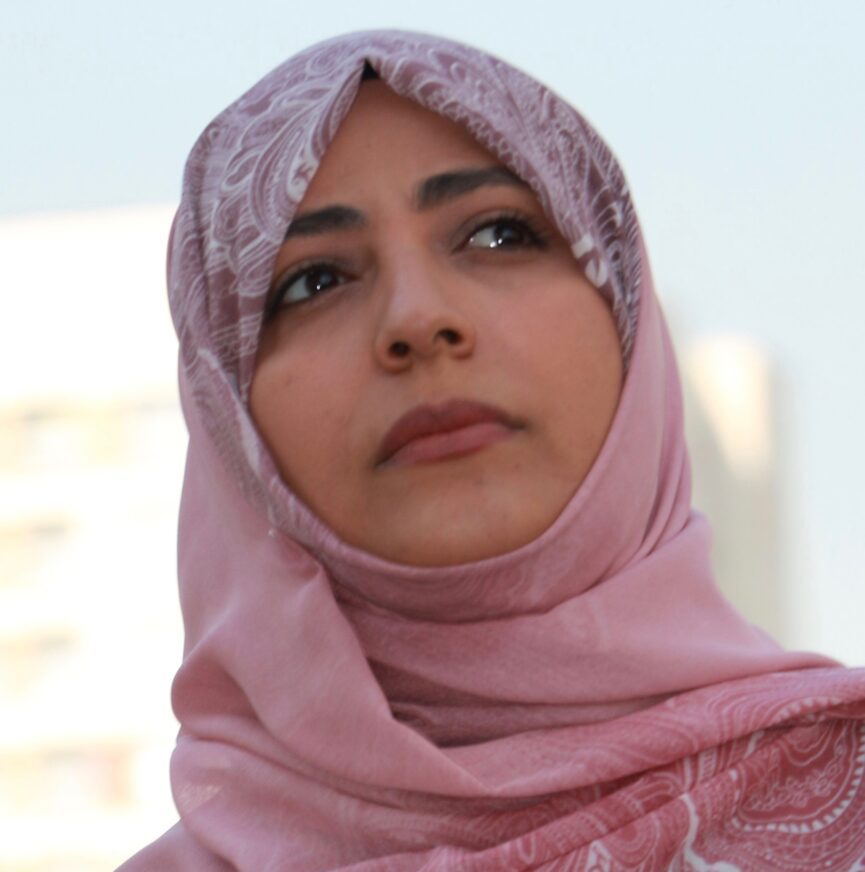
Tawakkol Karman
Nobel Peace Laureate

Kolinda Grabar-Kitarović
Former President, Croatia
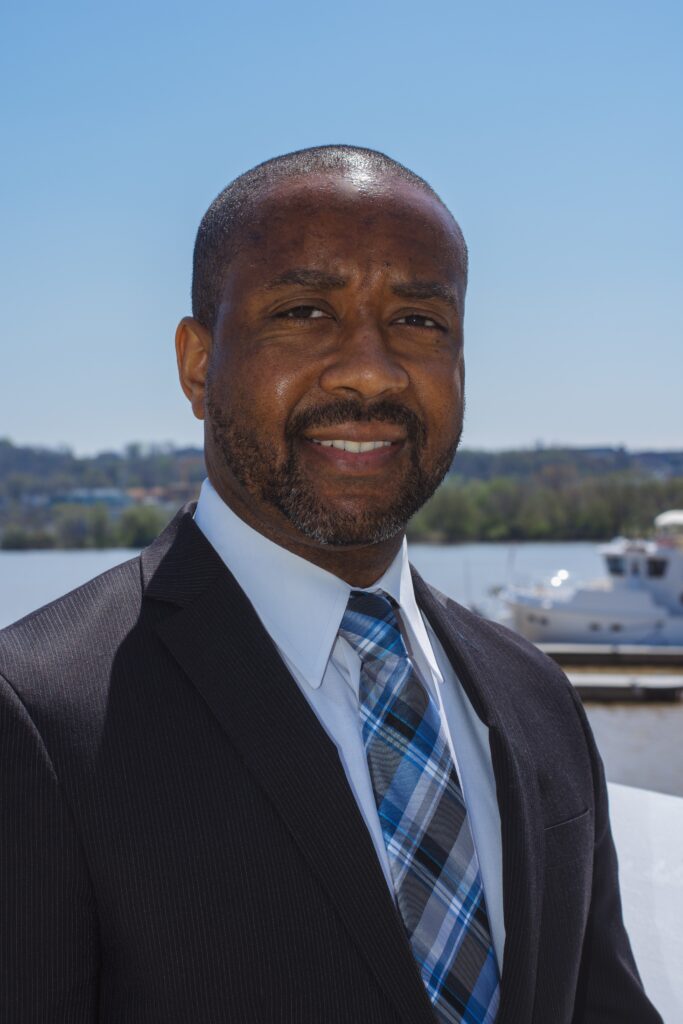
Bishop Garrison
Co-Founder and President, Rainey Center and Director, National Security Outreach, Human Rights First
The United States or Divided States of America? Although the COVID-19 pandemic has brought the world together in many ways, it often seems as if we have never been so divided. Whether it’s the erosion of trans-Atlantic partnerships, distrustful bi-partisan governing or tense dinner tables around the country, it can be difficult to build bridges over our differences, and that has consequences. Senator Tim Kaine believes that the American people have been let down by their government’s response to the COVID-19 pandemic.
Bishop Garrison spoke from a United States still reeling from the results of a bitterly fought election. He did, however, see reason for hope that the incoming Biden administration will help heal the divides in America – whether they are racial, economic or political. As Mark Hetfield points out, the United States is a very divided nation, and one of the issues that divides the country is the fear of immigration, and its incumbent on all of us to demonstrate that there is no reason to fear refugees.
Michael Abramowitz believes that people around the world look to the United States for leadership, but right now we are in a phase where the United States is a “tarnished tribune”. It’s a tough road ahead, but the US is hardly the first country to deal with a divided people. Kolinda Grabar-Kitarovic once thought that the people of her home in Croatia would never be able to coexist after a bitter war and collapse of the Soviet Union. Today, she said that thankfully she was wrong. And there are lessons to be learned from the Middle East as well – a region not often known for the resolution of deep conflict. Tawakkol Karman felt optimistic about the ability of the US to rebuild diplomatic relations around the world. She believes that if the American people can protect their democracy at home, it will provide an inspiring example for those abroad.
Whether it’s Croatia, Iran or the United States, the message was clear: the most important thing we can do to bridge our divisions is to listen to one another. Fostering democracy is the key to building a more unified world, where authoritarian leaders seek to exploit and divide it. Our panelists today proved that the United States is not alone in trying to heal a divided society. The US has long provided an example to the rest of the world. Today, they have allies who are willing to return the favour and lend a hand.
“Trust is the basis of any human relationship and trust is the basis of democracy.”
— Kolinda Grabar-Kitarović, Former President, Croatia
“The refusal of the President to accept the results of the election is really crucial to democracy, a peaceful transition of power. I guarantee that authoritarians here are watching to see how we have handled the election.”
— Michael Abramowitz, President, Freedom House
“Refugees and immigrants are one of the key factors that have made this country strong.”
— Mark Hetfield, President and CEO, HIAS
“I think the mismanagement of the pandemic played a key role for independent and Republican-leaning voters who looked at the US response and felt, I know we can do better.”
— Senator Tim Kaine, Senator from Virginia, United States Senate
“America has never dealt with the original sin of slavery.”
— Bishop Garrison, Co-Founder and President, Rainey Center, and Director, National Security Outreach, Human Rights First
“The world will see how inspiring democracy is when Trump leaves the White House peacefully.”
— Tawakkol Karman, Nobel Peace Laureate; Founder, Women Journalists Without Chains
11:30 EST
Plenary 2: China vs. Democracy: The Greatest Game On the record
Speakers
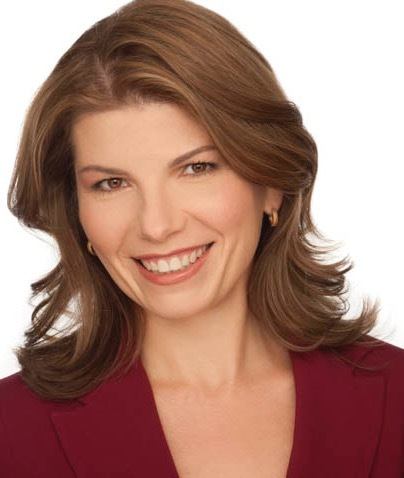
Moderator Luiza Savage
Executive Director, Editorial Initiatives, POLITICO
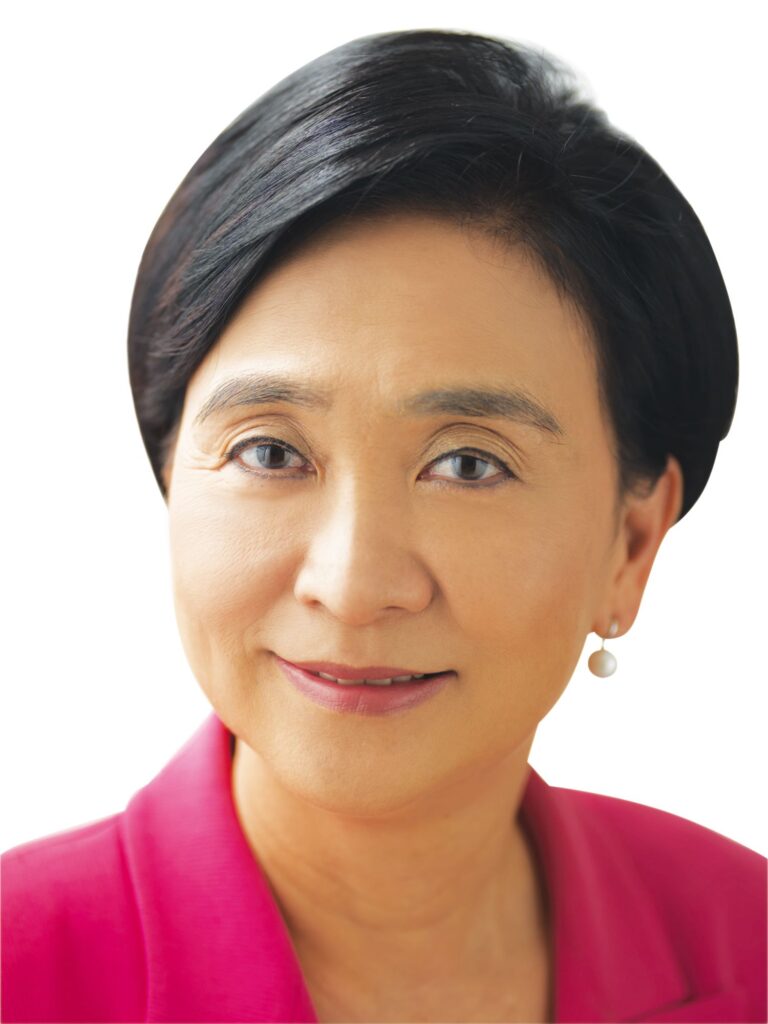
Emily Lau
Former Chairperson, Democratic Party and Former Member, Legislative Council
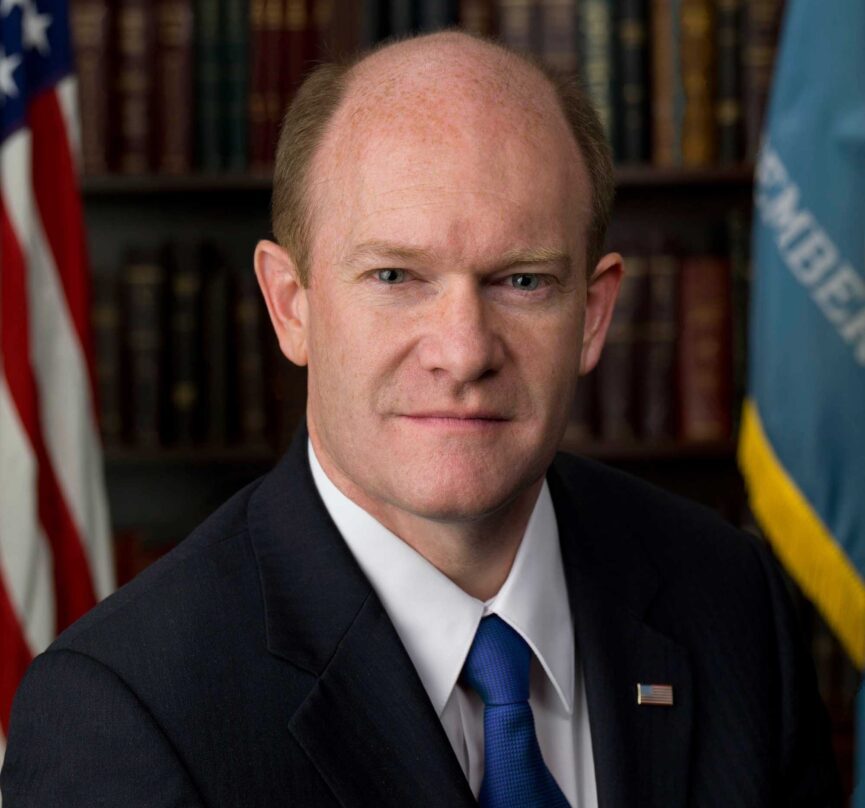
Chris Coons
Senator from Delaware, United States Senate
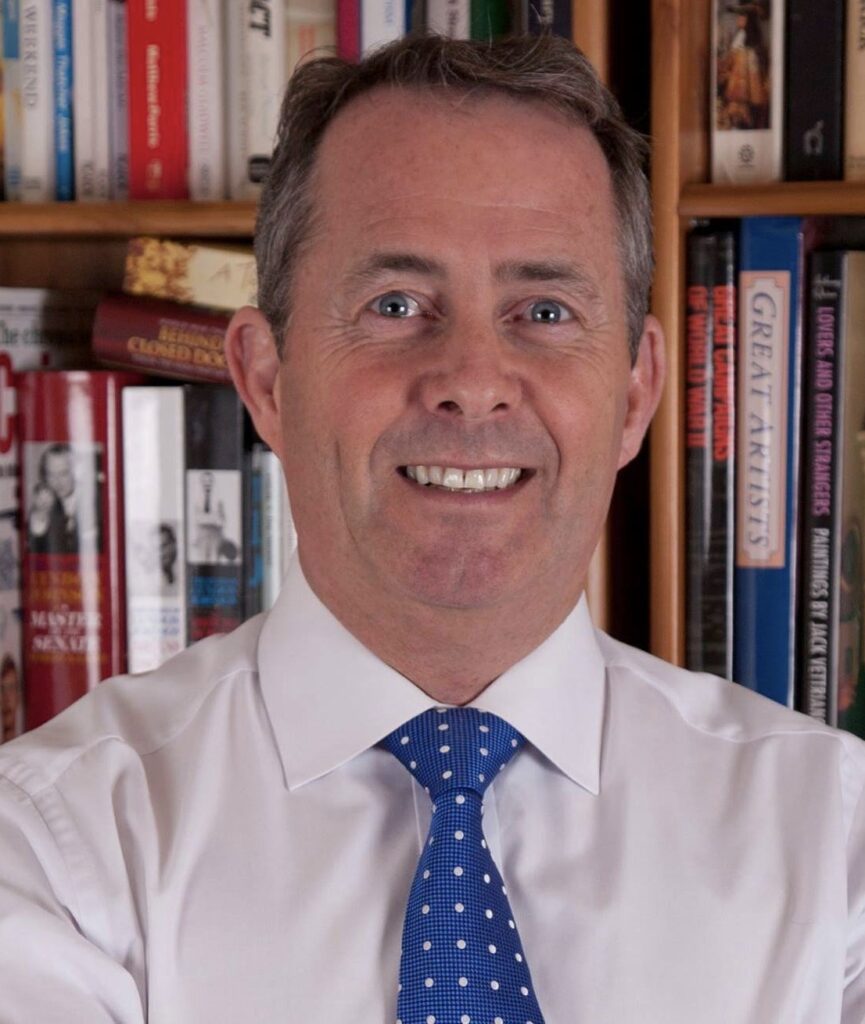
Liam Fox
Member of Parliament, U.K. House of Commons
As an existential threat to liberal democracies, China looms large as a generational challenge for the rules-based international order. Panelists weighed in today on some of the urgent challenges and solutions awaiting the new US administration when it comes to China’s increasing aggression on the world stage. How will 2020 change China’s relationship to the world? And what is the best, most tangible way to combat China’s aggressive diplomacy? Admiral Davidson felt that the United States has its work cut out for it in the Indo-Pacific – especially if America hopes to knit together its allies and partners, preserve the freedoms that come with that network and ensure access to the seas, skyways, cyberspace, and space for those nations interested in cooperating with each other. Paula Dobriansky believes that the wave of the future is agile alignments and partnerships, where very different countries can come together to counter the threat posed by China.
Although the outgoing Trump administration stood up to China, Senator Chris Coons believes that a more coordinated and diplomatic strategy will have greater impact. He hoped the new US President-elect will use his foreign-policy background to re-invigorate democratic alliances and provide a unified check on the rise of China. Liam Fox believes that the rules-based international order needs a few updates to reflect the importance of technology and financial transparency in the 21st century. Kenneth Braithwaite saw China’s rise playing out dramatically across the seas and that in order to join the great powers of the world, they must become a maritime nation.
The people of Hong Kong are on the front lines of China’s aggression and are fighting for freedom in the face of daunting obstacles. Emily Lau knows that the people of Hong Kong are frightened and are looking to democratic leaders for strength and solidarity. She appealed to leaders gathered at HFX2020 to stand with the people of Hong Kong in standing up to China.
Ai Weiwei underscored the risks for citizens who stand up against the Chinese Regime. Simply put, you cannot ask for justice in China. Mike Pompeo believes that all of us have a moral responsibility to think through our activities with China, and whether those activities are in our own national security interests.
At the end of the day, Western powers must believe wholeheartedly in the power of democracy. After all, if we don’t believe in our institutions, why should anyone else?
“It’s not free to stand up to China. China wants to set examples around the world so that other countries won’t challenge them.”
— Secretary Mike Pompeo, Department of State, United States
“The convergence around the idea of a free and open Indo-Pacific is what is bringing free nations in the Indo-Pacific together.”
— Admiral Philip Davidson, Commander, United States Indo-Pacific Command
“Countries that aren’t necessarily democracies are being brought into the fold, because of the economic challenges that are being created by China not following the rules.”
— Paula Dobriansky, Senior Fellow, The Future of Diplomacy Project, Belfer Center for Science and International Affairs, Harvard University
“The issue today is that we don’t have safe humanitarian space for neutral and impartial humanitarian action based on needs, and not on political needs or priorities.”
— Secretary Kenneth Braithwaite, United States Navy
“Money speaks very loudly and China has a lot of money to spend.”
— Emily Lau, Former Chairperson, Democratic Party; Former Member, Legislative Council
“The peaceful and orderly transition of power is one of the hallmarks of American democracy. Right now, President Trump is teaching exactly the wrong lessons about how we practice democracy here in the US.”
— Chris Coons, Senator from Delaware, United States Senate
“Everything China does in the international sphere is a test of our resolve.”
— Liam Fox, Member of Parliament; House of Commons, United Kingdom
Featured Speakers On the record
Speakers
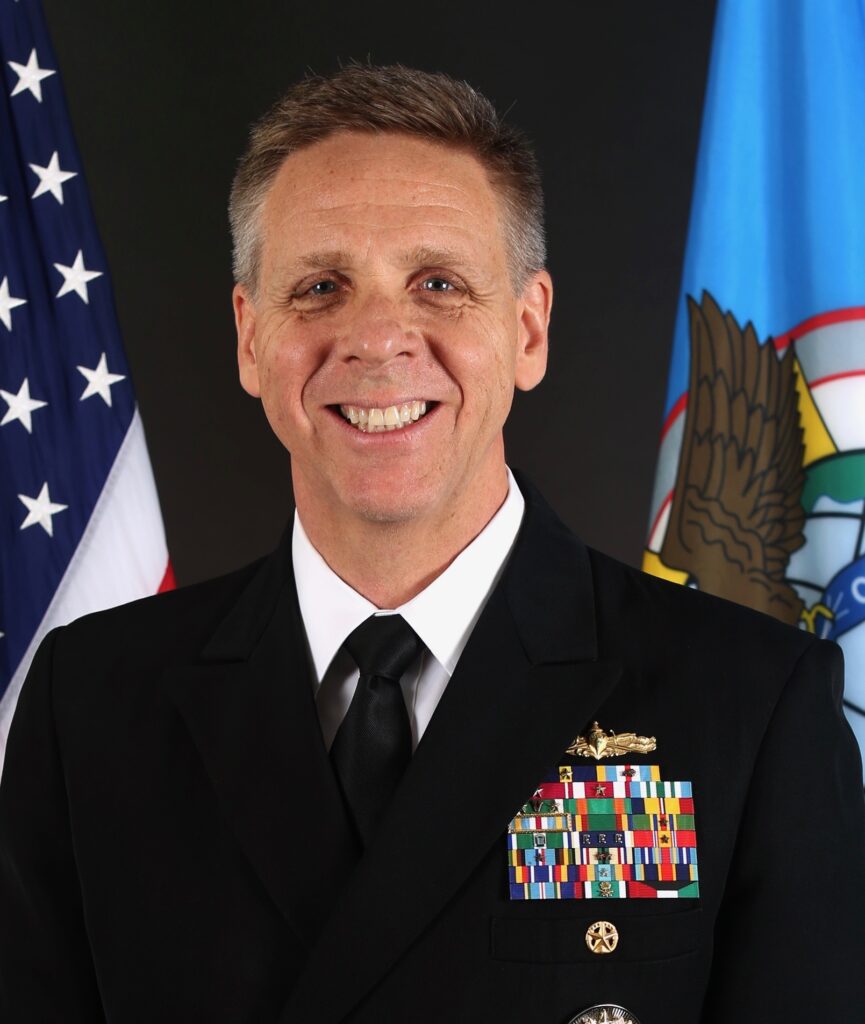
Philip Davidson
Commander, United States Indo-Pacific Command
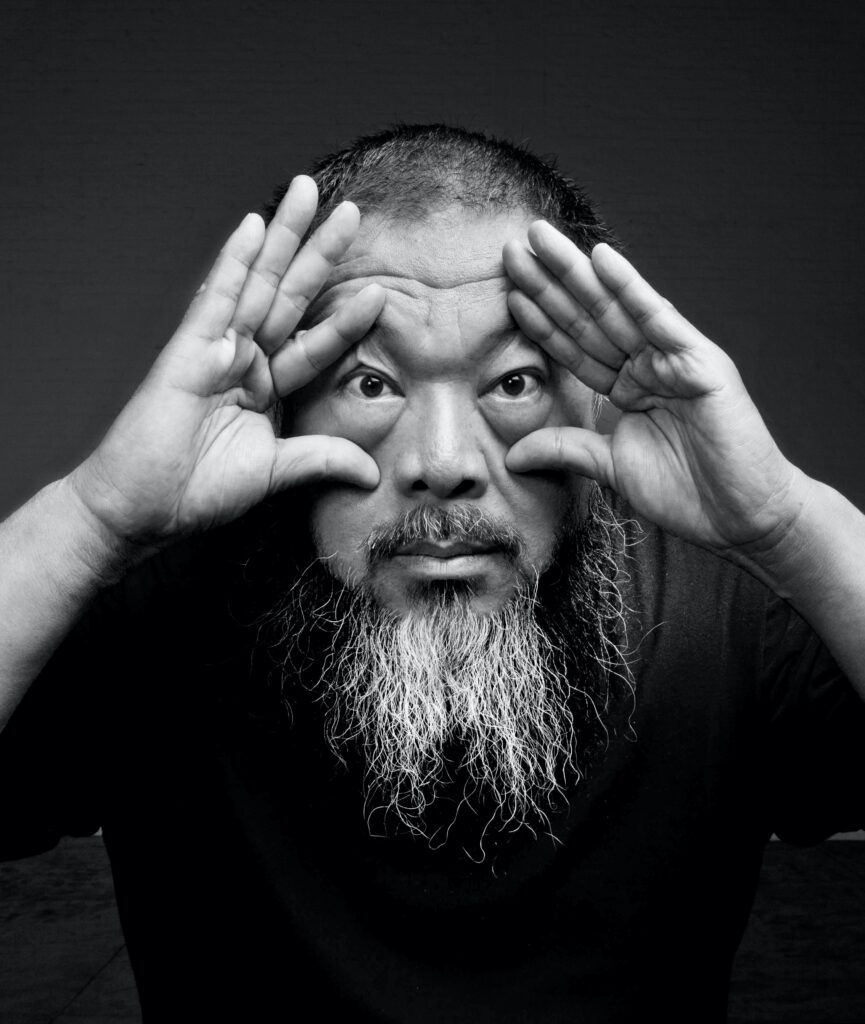
Ai Weiwei
Artist, Activist
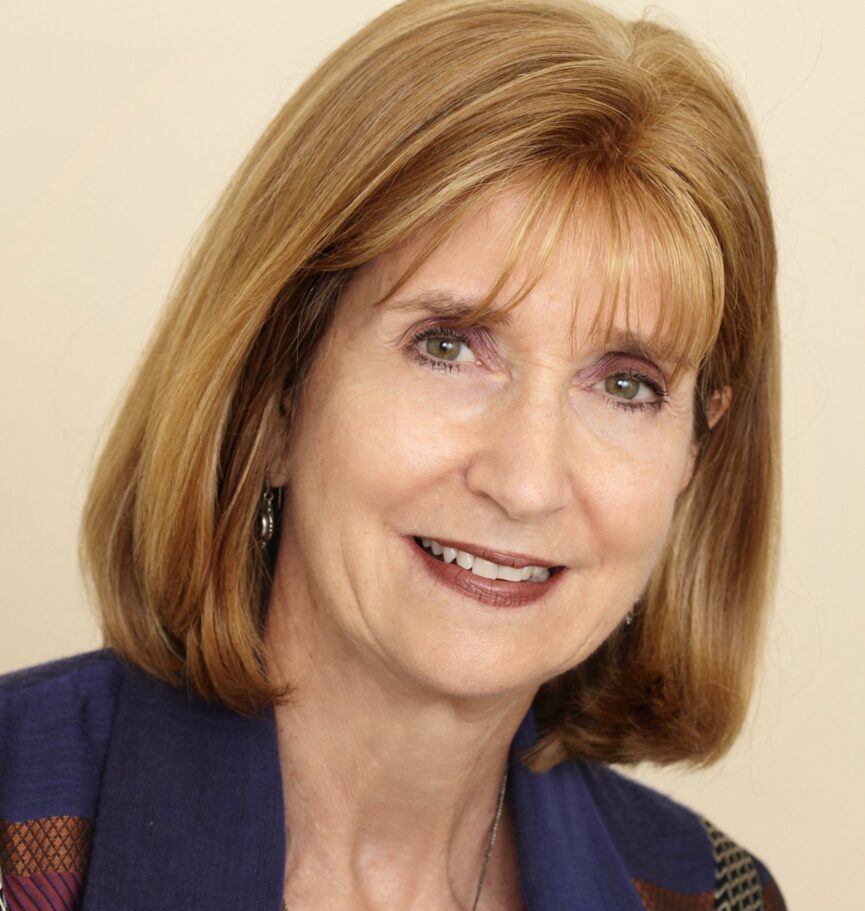
Paula Dobrianky
Senior Fellow, The Future of Diplomacy Project, Belfer Center for Science and International Affairs, Harvard University
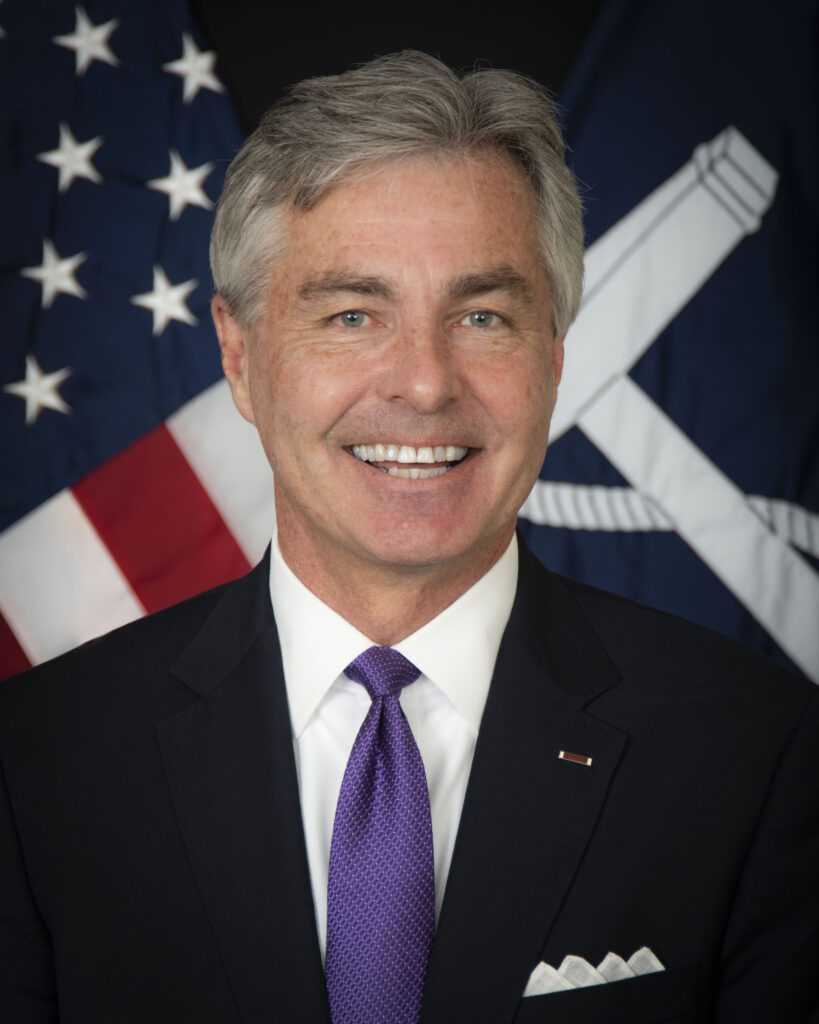
Kenneth Braithwaite
Secretary, United States Navy
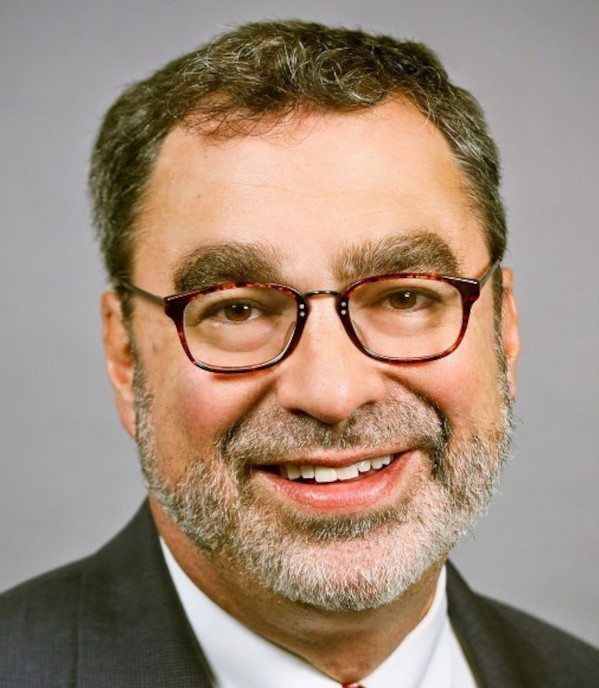
Mark Hetfield
President and CEO, HIAS
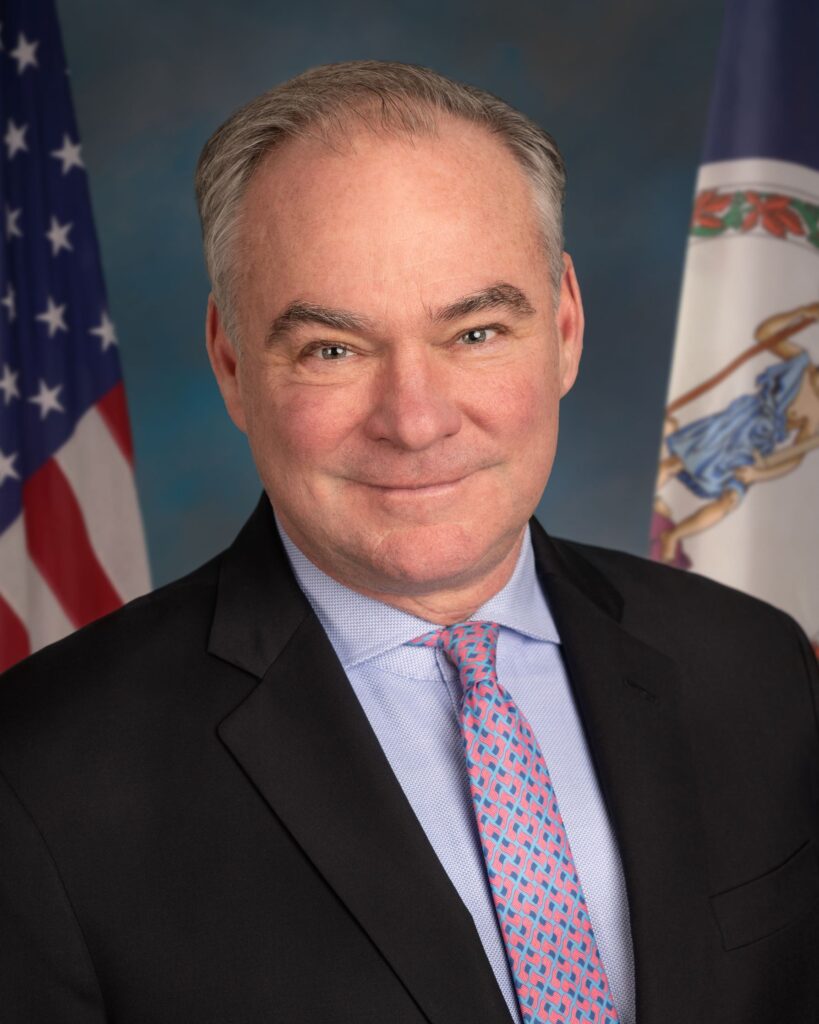
Tim Kaine
Senator from Virginia, United States Senate
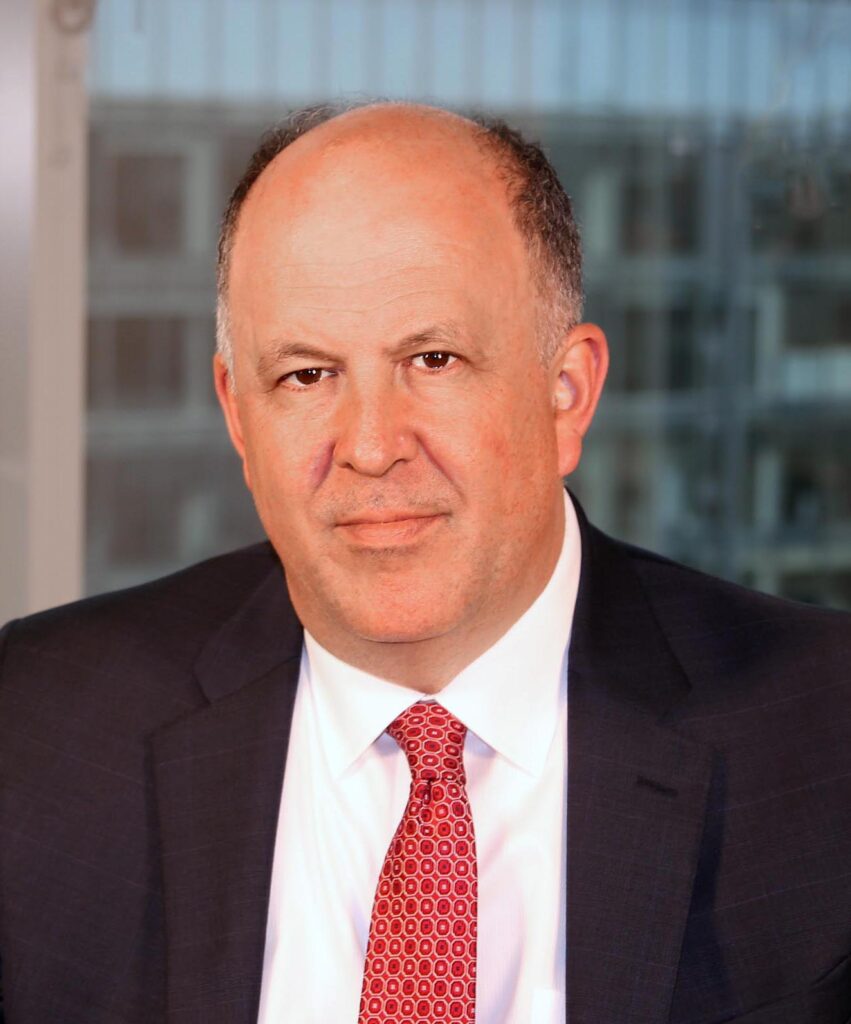
Michael Abramowitz
President, Freedom House
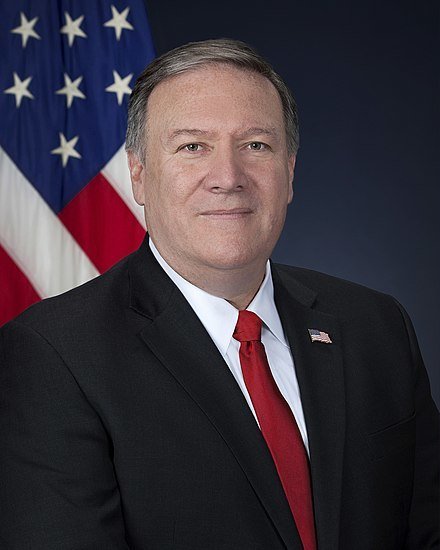
Mike Pompeo
Secretary of State, United States Department of State

